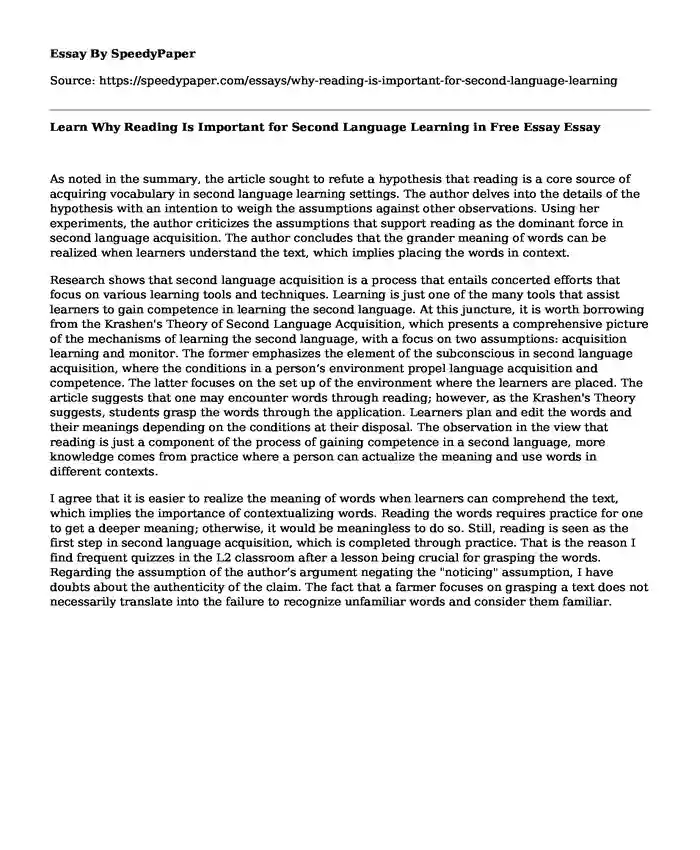As noted in the summary, the article sought to refute a hypothesis that reading is a core source of acquiring vocabulary in second language learning settings. The author delves into the details of the hypothesis with an intention to weigh the assumptions against other observations. Using her experiments, the author criticizes the assumptions that support reading as the dominant force in second language acquisition. The author concludes that the grander meaning of words can be realized when learners understand the text, which implies placing the words in context.
Research shows that second language acquisition is a process that entails concerted efforts that focus on various learning tools and techniques. Learning is just one of the many tools that assist learners to gain competence in learning the second language. At this juncture, it is worth borrowing from the Krashen's Theory of Second Language Acquisition, which presents a comprehensive picture of the mechanisms of learning the second language, with a focus on two assumptions: acquisition learning and monitor. The former emphasizes the element of the subconscious in second language acquisition, where the conditions in a person’s environment propel language acquisition and competence. The latter focuses on the set up of the environment where the learners are placed. The article suggests that one may encounter words through reading; however, as the Krashen's Theory suggests, students grasp the words through the application. Learners plan and edit the words and their meanings depending on the conditions at their disposal. The observation in the view that reading is just a component of the process of gaining competence in a second language, more knowledge comes from practice where a person can actualize the meaning and use words in different contexts.
I agree that it is easier to realize the meaning of words when learners can comprehend the text, which implies the importance of contextualizing words. Reading the words requires practice for one to get a deeper meaning; otherwise, it would be meaningless to do so. Still, reading is seen as the first step in second language acquisition, which is completed through practice. That is the reason I find frequent quizzes in the L2 classroom after a lesson being crucial for grasping the words. Regarding the assumption of the author’s argument negating the "noticing" assumption, I have doubts about the authenticity of the claim. The fact that a farmer focuses on grasping a text does not necessarily translate into the failure to recognize unfamiliar words and consider them familiar.
Cite this page
Learn Why Reading Is Important for Second Language Learning in Free Essay. (2017, Oct 11). Retrieved from https://speedypaper.net/essays/why-reading-is-important-for-second-language-learning
Request Removal
If you are the original author of this essay and no longer wish to have it published on the SpeedyPaper website, please click below to request its removal:
- Essay Example on Dynamic Business Environment
- Truffles Essay Example
- Free Essay Sample on the Madrars-Khanqah of Sultan Al-Ashraf Barsbay
- Trials and Verdicts - Free Essay in Criminal Justice
- Cyber Security Essay Sample: Credential Stuffing - Prevention
- Free Essay: The Glass Menagerie by Tennessee Williams
- Essay Example: Questioning Straightforward Corporeality and Penetration
Popular categories





